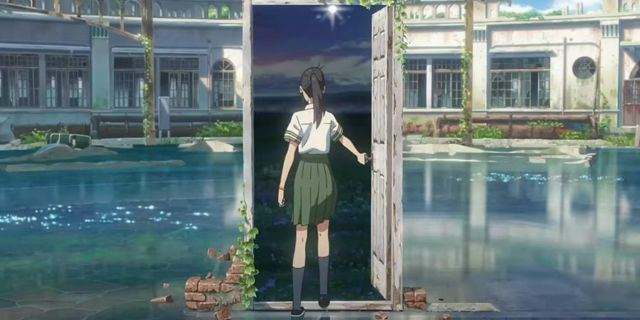Suzume, also known as Suzume no Tojimari in Japan, made its American debut on April 14, 2023, and has since earned praise as one of Makoto Shinkai’s best, if not the best, films. The movie has a poignant message about grief, calamity, and the sacrifice and loss of loved ones in addition to its captivating and expert animation.
Suzume Iwato, a 17-year-old girl with a mystery connection to mystical doors that serve as the only line of defense defending humanity from a terrible menace, serves as the movie’s main character. One day, as she is traveling to school, she encounters Souta Munakata, whose responsibility it is to keep these doors locked and the dangers that lurk behind them at bay. Suzume, moved by the compassion of her late mother, stands with Souta and aids him in preventing total annihilation of Japan. Although Suzume’s actions are a major plot point, her emotional ties to her mother and Souta are what motivate her. These focal elements all add up to a beautifully potent message when combined with the concepts that Shinkai brings throughout the movie.
Suzume’s Connections With Heroes and Their Sacrifices
Driven by her great sense of compassion as well as her sense of moral responsibility, Suzume is a high school student beyond her years. This is due to her resilience in facing grief at a young age. When she was a small child, she lived with her mom, who proudly worked as a nurse. Suzume shared a tight bond with her mom, but sadly, the loving parent-child relationship ended after the 2011 Earthquake in Japan. With no one else around to watch her, Suzume roamed the town searching for her mom who, most likely, died in the line of duty. As a teen, Suzume already has high hopes for following in her mother’s footsteps and becoming a nurse herself, which is what leads her to help Souta, not only with an injury early on in the film but also with his arduous journey.
As Suzume tackles the risks of putting her life on the line, she is guided by Souta, who is a “closer” — someone with the ancient task and mystical duty of keeping the nation safe from the threat of a cataclysmic entity known as “the worm.” Similarly to Suzume’s mother, Souta is diligent in his responsibility over civilians, placing his life on the line time and time again. His mentality in regard to his remarkable job is “Most important jobs, people shouldn’t see.” This sentiment echoes back to Suzume’s mother and how the work of a nurse, among other heroes of society, goes unnoticed. While the mother isn’t given much screen time and, therefore, much characterization, Souta is given the role of representing unsung heroes like her and the sacrifices they make.
With these two characters, Suzume’s mother and Souta, being key examples for Suzume to follow, a central focus of the film is set on the risks and sacrifice of first responders as well as medical professionals. Though the film is certainly about coping with the tragedy of natural disasters, it pays incredible homage through these characters to the sacrifices of first responders and medical professionals who are lost to these kinds of horrifying events. There’s a powerful tonal shift that is balanced, going from the acceptance of unavoidable sacrifices, like with Suzume’s mother, to a reminder that these unsung heroes are people who deserve as much of a chance to live as anyone else. This complexity of the film is found to be practiced within the titular character, Suzume.
The Power of Suzume’s Actions in Makoto Shinkai’s Latest Movie
As the protagonist comes into her own as a risk-taking hero, she comes to understand how fragile life is for those on the front lines of disaster. From losing her mom, she knows too well the pain of loss and grief yet isn’t resentful of her mom or Souta. From her coping, she finds nothing short of great pride and respect for them both and pushes herself to her limits in following their paths to protect the greater good. Unfortunately, what she learns from her partnership with Souta is that responsibility often comes with moments of tough decision-making.
Later in the movie, when Suzume must decide between saving the lives of Souta and Tokyo’s millions of residents, she makes the painful decision to save the lives of the former. Suzume still wants to save Souta because she sees how much potential he has in his life, even after saving the masses and realizing that sacrifices are a part of this profession. Suzume spends the last third of the movie fully intending to sacrifice herself to save Souta and spare her country after realizing that death is a natural part of life and finding the courage to be fearless of it. Her strength in helping others around her in the face of danger and tragedy is a tribute to the movie’s main theme.
Suzume is an all-encompassing fantasy movie that draws inspiration from real-world tragedies and conveys a strong message for humanity. Regarding his movie, Shinkai said, “I believe that we will experience many different types of disaster over the decades of our lives. A lot of societal aspects will abruptly alter or come to an end. However, humans will still find a way to survive even after that. The movie is clearly about humanity’s will to survive and deal with natural disasters when these statements are kept in mind. The principles of duty and sacrifice found in real-life heroes who risk all so that another may have even one are at the heart of this supernatural film’s heroes.















Leave a Reply